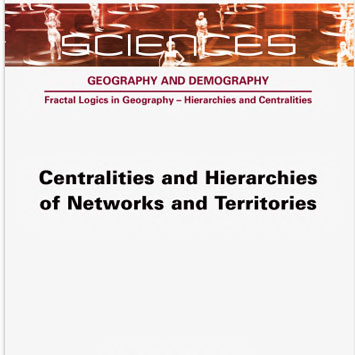
- Details
- Category: Publication and Output
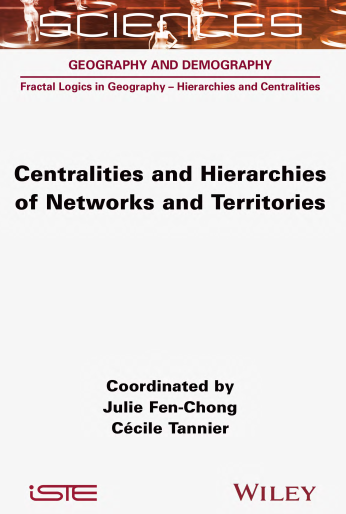 Digital data, graph theory and spatial modeling allow us to apply the concepts of centralities and hierarchies to a wide variety os spatial situations.
Digital data, graph theory and spatial modeling allow us to apply the concepts of centralities and hierarchies to a wide variety os spatial situations.
The authors of this book offer insight into centralities and hierarchies within networks and territories at different scales and temporalities and for different socio-economic phenomena.
The first part of the book explores the contribution of data from cell phones and social networks to understanding centralities and hierarchies of urban space within a circumscribed temporality. The second part uses network analysis – ecological networks, media networks and scientific knowledge networks – to propose indicators of spatial organization that reveal the centralities and hierarchies of spatial systems. Finally, in the third part, the territorial processes behind the formation of centralities and hierarchies are presented from a long-term perspective.
https://www.iste.co.uk/book.php?id=2267

Funded PhD project: Modeling and simulation of urban transport electrification through digital twins
- Details
- Category: Job
 The energy transition necessitates a rapid electrification of urban transport systems. This PhD project aims to design and experiment with an innovative digital modeling of electrified transport networks, leveraging digital twin technologies.
The energy transition necessitates a rapid electrification of urban transport systems. This PhD project aims to design and experiment with an innovative digital modeling of electrified transport networks, leveraging digital twin technologies.
The project fits within a large-scale prospective simulation perspective, using 3D spatial data, territorial indicators, and multi-agent or geosimulation approaches.
The objective is to propose operational electrification scenarios adapted to the territories of the Bourgogne Franche-Comté region.
Research laboratories involved are ThéMA, Femto-st and CRESE. The thesis will begin in October 2025. The call for application is open until the 15th of September 2025. Please send the following by email to
All information here
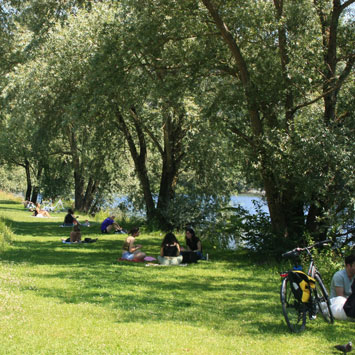
- Details
- Category: Diffusion

A survey is launched to gather accounts from a large panel of Besançon's inhabitants. This survey is part of the research project CAPBIOMET carried out by Manon Kohler and supported by the regional council of Bourgogne-Franche-Comté and the local agency Grand Besançon Métropole.
Accounts gathered via the survey will enable a better understanding of local practices to adapt to summer heat.
Access to the survey registration form: https://thema.univ-fcomte.fr/enquete2/index.php/785683?lang=fr
Contact:
Manon Kohler is researcher at the French National Centre for Scientific Research (CNRS) and member of ThéMA research lab,
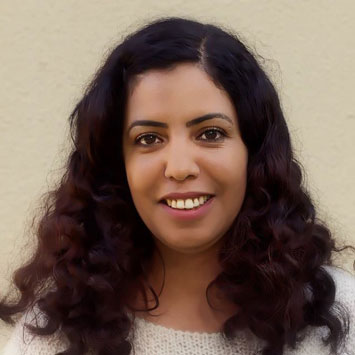
- Details
- Category: Diffusion

Bahija Hani has begun a doctoral research under the co-supervision of Prof. Thomas Buhler. The title of her research is: Discursive strategies and spatial development in Fès (Morocco): critical and textual data analysis of planning documents related to the emerging local centres of Ouled Tayeb and Ain Bida.
Bahija Hani is architect and urban designer. Her PhD thesis at ThéMA laboratory is under the joint administrative supervision of the University Ibn Tofail (Kénitra, Morocco) and the University Marie et Louis Pasteur (Besançon, France). The aim of her research is to understand how planning documents and speeches influence the evolution of two neighbourhoods in the city of Fès (namely Ouled Tayeb and Ain Bida) that are currently being dramatically transformed.
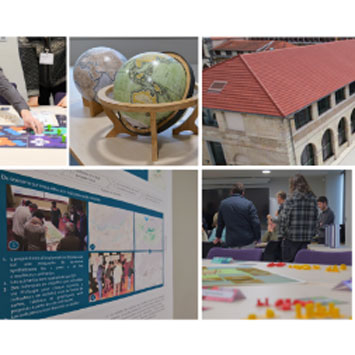
- Details
- Category: Conference
The 17th Théo Quant Meetings will take place in Besançon, from the 4th to the 6th of February 2026
The spirit of the Meetings
"Theo Quant" Meetings take place in France every two years. They are intended to be an intermediary between big symposia, where only completed work is presented, and conferences dedicated to specific themes.
The "Theo Quant" Meetings aim to further methodological and theoretical investigation in the field of theoretical and quatitative geography. One of their main interests is to allow the exchange of points of view and ideas between researchers of different generations (confirmed researchers and PhD students).
Web site : https://theoquant2026.sciencesconf.org/.
Contact :
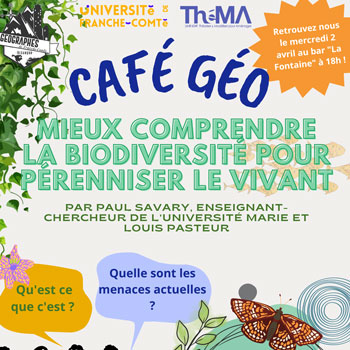
- Details
- Category: General public
A Café Géo, organized by the Association of Geographers of Franche-Comté, will take place on Wednesday the 2nd of April from 18:00 to 20:00 at the bar La Fontaine (Place de la Révolution, Besançon). This talk about biodiversity will be held by Paul Savary, Assistant Professor at Université Marie et Louis Pasteur (ThéMA laboratory).
Better understanding biodiversity for sustaining all life forms
Life takes all kinds of forms and we use the term biodiversity to characterize this complexity. Humans impact biodiversity to such an extent that limiting this impact has become central to land planning strategies. This talk will be the opportunity to define what biodiversity actually is, in order to explain what are the main causes of human impact on all life forms. Finally, we will mention the limitations of current conceptions of these issues and the main obstacles hindering the effectiveness of their potential solutions.
There will be time for questions and debates after the talk
The event is free and open to all.
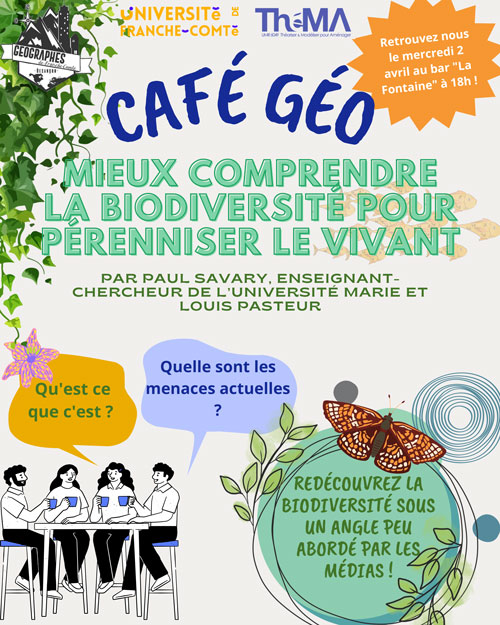
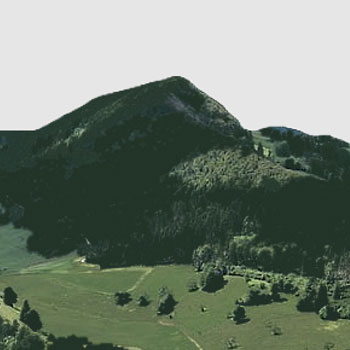
- Details
- Category: General public
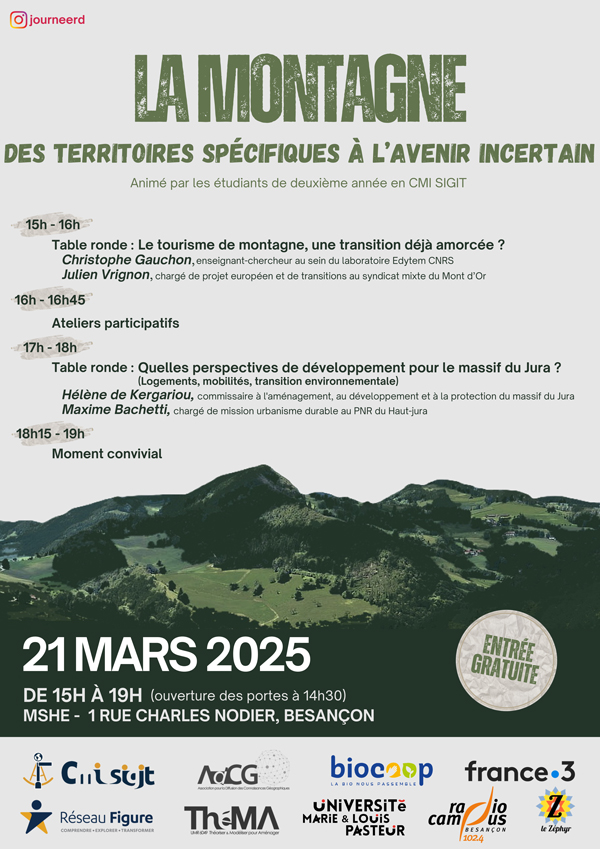
The second-year students of the CMI SIGIT undergraduate program (Cursus Master en Ingénierie Science de l’Information Géographique pour l’Innovation Territoriale) organise an afternoon of conferences and participative workshops on the following topic: “The mountain: specific territories with uncertain future”. The discussions will be about the current issues associated with the development of mountainous areas.
Four guest experts will participate in this afternoon of exchange:
- Christophe Gauchon, Full Professor at the EDYTEM laboratory (Université Savoie Mont Blanc – CNRS)
- Julien Vrignon, Project manager at Syndicat mixte du Mont d’Or, dedicated to transition programs and European projects
- Hélène de Kergariou, State auditor for the development and protection of the Jura mountain territorial entity (so-called “commissaire de massif”)
- Maxime Bachetti, project manager at the Haut-Jura Natural Regional Park, dedicated to sustainable urbanism programs
The event will take place in the conference hall of the Maison des Sciences de l’Homme et de l’Environnement (MSHE), 1 rue Charles Nodier in Besaçon (25), on Friday the 21st of March 2025.
The doors will open at 14:30 and the conference will start at 15:00.
Free entrance
Note that the organizers will give live interviews about the event on: Radio Campus, on Thursday the 13th of March at 13:00
and France 3 Bourgogne-Franche-Comté, on Wednesday the 19th of March during the 12:00 news flash.
You can also find more information about the event on Instagram at @journeerd
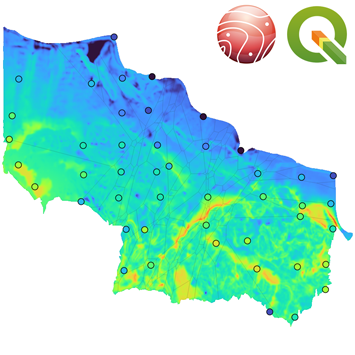
- Details
- Category: Publication and Output

Landsklim allows you to make spatial interpolations from quantitative data, from the reading of the initial data to the statistical analyses and the spatial interpolation. The program has been developed at ThéMA Laboratory in Besançon and integrates the features of the LISDQS interpolation software written by Daniel Joly.
The Lansklim plugin is available for download as a QGIS plugin. For further details: https://thema.univ-fcomte.fr/productions/software/landsklim
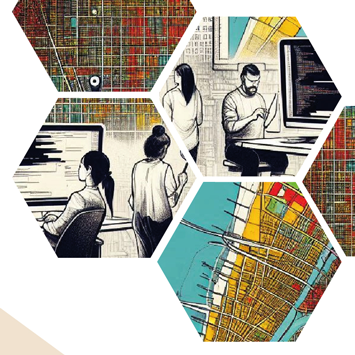
- Details
- Category: Diffusion
This one-day workshop is dedicated to the analysis of documents of territorial planning. It will give the opportunity to analyse planning politics at several scales. Participants will explore several interpretative frameworks that were previously applied to different types of planning documents. Participants will also think about benefits and limits of qualitative and quantitative approaches.

In the morning, a round-table discussion will enable researchers to share their methodologies to analyse planning documents: local urban design plans, local mobility plans, regional schemes for economic development, etc. Topics of the documents will be diverse: urban logistics (Laetitia Dablanc), mobility (Thomas Buhler, Jean Debrie), economic sector strategies (Thibaud Bages).
In the afternoon, Nicolas Lépy (Research Officer, ThéMA, Besançon) will present two sessions dedicated to the practical initiation to the use of TXM (a tool for automatic textual analysis of documents) and Yolo (an image analysis tool).
ThéMA's contact : Thomas Buhler
Register : https://evento.renater.fr/survey/28-01-25_decrypter-l…-3u5bv1c3

- Details
- Category: Dissertation Defence
Yohan Sahraoui will defend his accreditation to supervise research entitled: Hybrid landscapes. A critical and participatory modelling. The defence will take place on the 9th of January 2025 at University Paris 1 Panthéon Sorbonne, Centre Panthéon, 12 Place du Panthéon, 75231 Paris.
The jury comprises:
- Xavier Arnauld de Sartre, Research director CNRS – Recorder
- Thierry Joliveau, Emeritus professor, University Jean Monnet Saint-Etienne – Examiner
- Yves-François Le Lay, Professor, Ecole Normale Supérieure de Lyon – Recorder
- Nathalie Long, Research director CNRS – Examiner
- Pascal Marty, Professor, University Paris 1 Panthéon-Sorbonne, CNRS (MFO) delegation – Guarantor
- Cécile Tannier, Research director CNRS – Examiner

